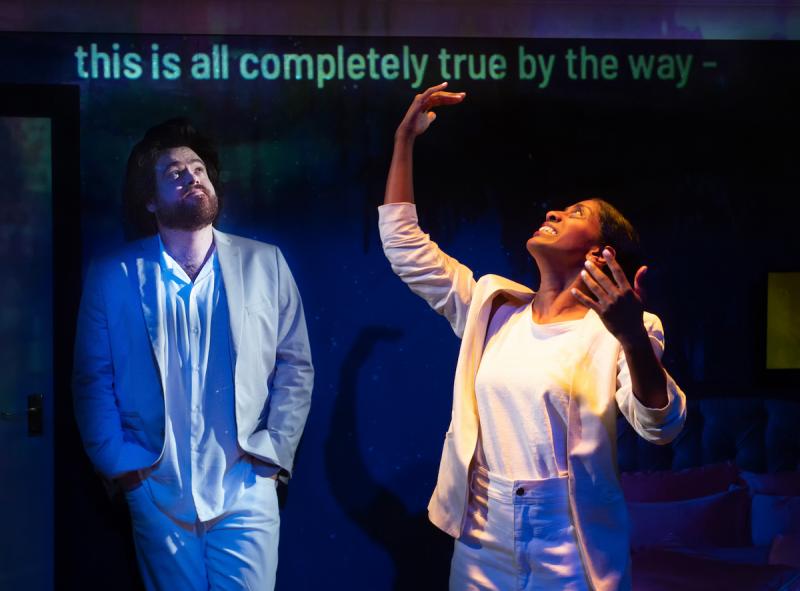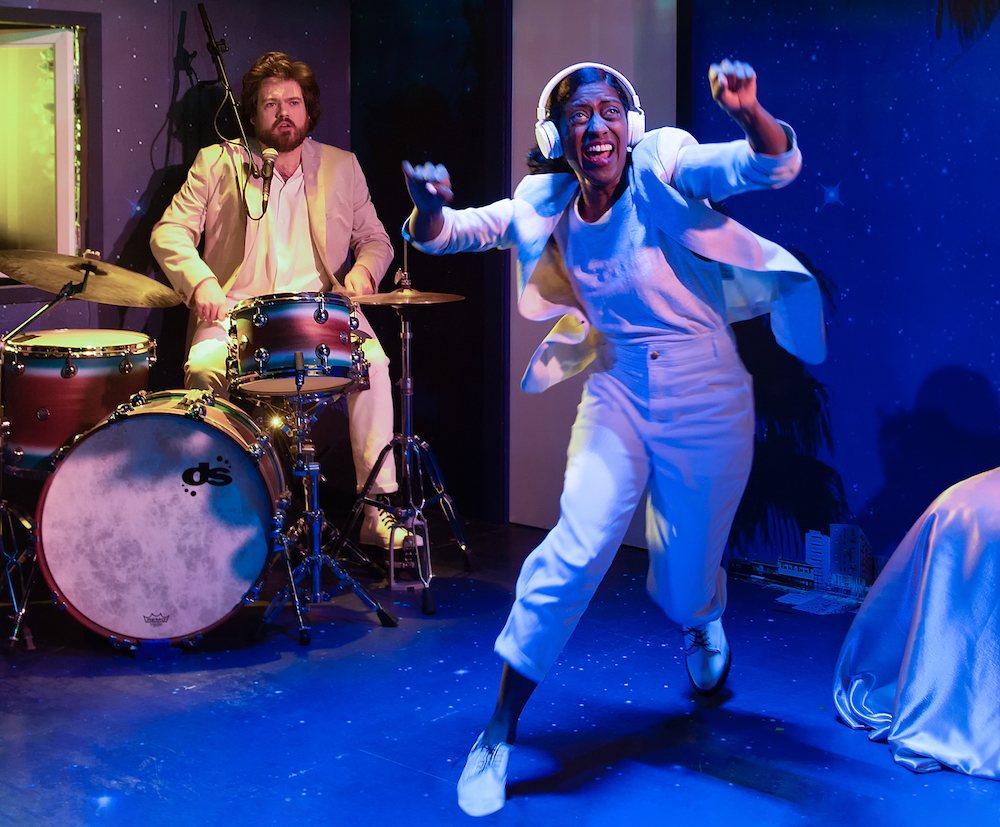Midnight Movie, Royal Court review - sleepless and digital | reviews, news & interviews
Midnight Movie, Royal Court review - sleepless and digital
Midnight Movie, Royal Court review - sleepless and digital
New autobiographical play about night thoughts on bodies real and digital

Eve Leigh is an experimental playwright who has tackled difficult issues for more than a decade. Yet most members of the public will know her, and her actor husband Tom Penn, as the neighbours who recorded an altercation between Boris Johnson and Carrie Symonds in June this year. At least, that's what it says on the internet. But don't let this distract you.
Leigh, whose previous work has included accounts of the trauma of neglect, loss and the use of mental institutions to punish dissidents, explores the experience of surfing the internet in the middle of the night, when everyone else has gone to sleep. Being Extremely Online. For her, being sleepless is a battle: due to a medical condition, she's in constant pain so the internet is a welcome distraction from discomfort. So she flips open her laptop. Hits a search engine. What does she find there? Oh, the usual: images, ideas and stories. She likes weird. So she jumps from one weird thing to another, then presses a previous tab and repeats a previous image or sound or word meal.
For about 75 minutes it feels as if we are in the middle of Leigh's intimate experience of the digital world. As Joe Orton once joked, “It feels real, so it must be real.” But is it really? Two performers play Avatar versions of her, one a large bearded man and the other a deaf Asian woman, inviting us into the playwright's head, but with a twist. In a collage of vivid impressions of all kinds, she shows an avalanche of strange stories: a woman fights an invisible monster while trapped in an LA lift, a man takes a bath in a hotel room, silicone ants eat digital memories, a goddess from Delhi loses her power to hold water. It is mainly, as Leigh admits, "some wank on the internet". Oh well.
 The good news is that Leigh can really write. There is something so touching, so raw, about the pain that soaks through the show like night sweats drenching your T-shirt. Whatever the ethics of using autobiographical material for public display, putting yourself so disarmingly on the line, it's hard to deny, or decry, the power of the core emotions here. Leigh comes across as an anguished spirit, but one capable of mocking herself and her obsessions; her physical pain is also mental pain; her loneliness is occasionally palpable. On a more cerebral level, there are two big ideas in the show.
The good news is that Leigh can really write. There is something so touching, so raw, about the pain that soaks through the show like night sweats drenching your T-shirt. Whatever the ethics of using autobiographical material for public display, putting yourself so disarmingly on the line, it's hard to deny, or decry, the power of the core emotions here. Leigh comes across as an anguished spirit, but one capable of mocking herself and her obsessions; her physical pain is also mental pain; her loneliness is occasionally palpable. On a more cerebral level, there are two big ideas in the show.
One is the concept of the midnight movie and the other is the idea of the digital human, the digital body. The midnight movie is any piece of film that is so weird, so inexplicable, that you could never see it at the cinema or on television. It might be voyeuristic, sadistic, Big Brotherish or a murder mystery. Weird scenes inside the cold mine; terrible things you really don't want to know about. Intimate moments caught online. A drive-in from hell. The digital body is our internet being: if you are unhappy with your real body, or if it has let you down, why not create an online persona: you can be anybody you like.
Of course, it is difficult to represent the cool life of the screen in three-dimensional sweaty reality. Leigh tries to break down the distinction between the two by saying that she has a visual disorder which means that she actually sees in 2-D. On stage, the play is set in an attic bedroom, with a pink bed, and the two avatars are dressed in white suits. While Penn speaks the lines, Nadia Nadarajah performs by signing; at various moments, they play the drums, dance and sing (pictured above), and the play's words are projected on the back of the stage. With its signing, audio description and captioning, this is an inclusive performance. At the same time, there is a service called The Digital Body, for all those who can't make it to the theatre. You sign up to get random emails which have the same sensibility as the show. Go for it!
Fittingly, the press night took place on Unesco's International Day of Persons with Disabilities, and Bagshaw's production has moments of sly humour and, at its best, reminds us that sometimes we can never really know what even our nearest and dearest are thinking, are feeling. Penn and Nadarajah have a good onstage chemistry, but despite the intelligence and sensitivity of the writing – occasionally subjectively intense – the show is oddly unengaging. I wanted to love this Midnight Movie, but – like any screen experience – I couldn't quite connect with it. It feels like less than the sum of its parts.
rating
Share this article
The future of Arts Journalism
You can stop theartsdesk.com closing!
We urgently need financing to survive. Our fundraising drive has thus far raised £49,000 but we need to reach £100,000 or we will be forced to close. Please contribute here: https://gofund.me/c3f6033d
And if you can forward this information to anyone who might assist, we’d be grateful.

Subscribe to theartsdesk.com
Thank you for continuing to read our work on theartsdesk.com. For unlimited access to every article in its entirety, including our archive of more than 15,000 pieces, we're asking for £5 per month or £40 per year. We feel it's a very good deal, and hope you do too.
To take a subscription now simply click here.
And if you're looking for that extra gift for a friend or family member, why not treat them to a theartsdesk.com gift subscription?
more Theatre
 The Billionaire Inside Your Head, Hampstead Theatre review - a map of a man with OCD
Will Lord's promising debut burdens a fine cast with too much dialogue
The Billionaire Inside Your Head, Hampstead Theatre review - a map of a man with OCD
Will Lord's promising debut burdens a fine cast with too much dialogue
 50 First Dates: The Musical, The Other Palace review - romcom turned musical
Date movie about repeating dates inspires date musical
50 First Dates: The Musical, The Other Palace review - romcom turned musical
Date movie about repeating dates inspires date musical
 Bacchae, National Theatre review - cheeky, uneven version of Euripides' tragedy
Indhu Rubasingham's tenure gets off to a bold, comic start
Bacchae, National Theatre review - cheeky, uneven version of Euripides' tragedy
Indhu Rubasingham's tenure gets off to a bold, comic start
 The Harder They Come, Stratford East review - still packs a punch, half a century on
Natey Jones and Madeline Charlemagne lead a perfectly realised adaptation of the seminal movie
The Harder They Come, Stratford East review - still packs a punch, half a century on
Natey Jones and Madeline Charlemagne lead a perfectly realised adaptation of the seminal movie
 The Weir, Harold Pinter Theatre review - evasive fantasy, bleak truth and possible community
Three outstanding performances in Conor McPherson’s atmospheric five-hander
The Weir, Harold Pinter Theatre review - evasive fantasy, bleak truth and possible community
Three outstanding performances in Conor McPherson’s atmospheric five-hander
 Dracula, Lyric Hammersmith review - hit-and-miss recasting of the familiar story as feminist diatribe
Morgan Lloyd Malcolm's version puts Mina Harkness centre-stage
Dracula, Lyric Hammersmith review - hit-and-miss recasting of the familiar story as feminist diatribe
Morgan Lloyd Malcolm's version puts Mina Harkness centre-stage
 Reunion, Kiln Theatre review - a stormy night in every sense
Beautifully acted, but desperately grim drama
Reunion, Kiln Theatre review - a stormy night in every sense
Beautifully acted, but desperately grim drama
 The Code, Southwark Playhouse Elephant review - superbly cast, resonant play about the price of fame in Hollywood
Tracie Bennett is outstanding as a ribald, riotous Tallulah Bankhead
The Code, Southwark Playhouse Elephant review - superbly cast, resonant play about the price of fame in Hollywood
Tracie Bennett is outstanding as a ribald, riotous Tallulah Bankhead
 The Lady from the Sea, Bridge Theatre review - flashes of brilliance
Simon Stone refashions Ibsen in his own high-octane image
The Lady from the Sea, Bridge Theatre review - flashes of brilliance
Simon Stone refashions Ibsen in his own high-octane image
 Romans: A Novel, Almeida Theatre review - a uniquely extraordinary work
Alice Birch’s wildly epic family drama is both mind-blowing and exasperating
Romans: A Novel, Almeida Theatre review - a uniquely extraordinary work
Alice Birch’s wildly epic family drama is both mind-blowing and exasperating

Add comment